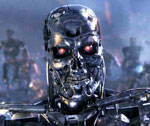
Recently came across this post on Cracked.com, through a Facebook link from Geek Fights.
I just couldn't read through this whole thing and not provide my two-cents of input. So I am going to provide a defense for every "reason" that this article gives for the movies making "no God damn sense". Because I like the Terminator movies. And the author is wrong.
[More]
9dc2fe9e-a571-4720-9617-4e28a1df046a|1|5.0
Tags:Terminator, Terminator 2: Judgement Day, Terminator 3: Rise of the Machines, Terminator Salvation, Terminator: The Sarah Connor Chronicles, Arnold Schwarzenegger, Robert Patrick, time travel, science fiction, Geek Fights, Cracked.com, Kurt Vonnegut, Slaughterhouse-Five
After a friend of mine posted a video on Facebook depicting two Cleverbots talking to one another, I decided the check the software out for myself. I had never visited the site before, so I was curious to see how well it measured up.
A full transcript follows:
[More]
I recently discussed some the problems inherent to time travel in works of fiction. Most notably, the paradoxes contained in the Terminator and Back to the Future movies. But now I want to take a step back and look at time itself.
Does "time" even exist?
The standard notion of time is that it is a fourth dimension just as fundamental and intrinsic to the universe as the three spatial dimensions of length, width, and height.
But the truth is: time is just an abstraction of the human imagination. It is a convenient construct that we use to explain relationships between things in our universe. Like motion, time does not exist without the objects that we use as a frame of reference for measuring it.

Time is scientifically defined as a relationship to the rate of decay of a radioactive caesium atom. It is also often linked with the speed of light, which is often seen as a “cosmic speed limit”.
But is this view of time really necessary? Is time truly a fundamental property of our universe?
“What we observe is not nature itself, but nature exposed to our method of questioning”
- Werner Heisenberg, father of quantum physics.
[More]
Time travel is a difficult subject. It also happens to be a very popular subject of many stories in books, television, movies, video games, and so on. But human kind's limited understanding of the workings of time and the possibility of time travel (especially the limited understanding of the casual book reader, movie viewer, or video game player) leads to depictions of this subject being wrought with logical inconsistencies, paradoxes, and plot holes.
One of the most common problems with time travel stories is the creation of paradoxes. Of these, some of the most common paradoxes are the "predestination paradox", the "bootstrap paradox", and the "grandfather paradox" (or the "reverse grandfather" paradox). You're probably familiar with all of these, but you may not know them by name, so I'll take a moment to define them for you:
[More]